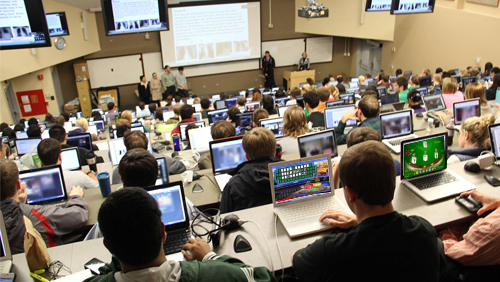Computer gambling games in classrooms? Why not, says a University of Bristol professor.
 Paul Howard-Jones, a professor of neuroscience and education, wants the majority of lessons, in all subjects, be taught using computer gambling games, which he believes promotes focus while also giving the students the same thrill as riding a rollercoaster, TES reported.
Paul Howard-Jones, a professor of neuroscience and education, wants the majority of lessons, in all subjects, be taught using computer gambling games, which he believes promotes focus while also giving the students the same thrill as riding a rollercoaster, TES reported.
For his study, Howard-Jones had 24 postgraduate students for teams of three and start a game, in which they must correctly answer a question to gain points. Then, the students had to spin a “wheel of fortune,” which gave them a 50-50 chance of either doubling their points or losing all of them.
Using brain-imaging technology, Howard-Jones found that the brain area that indicates distraction and inattention was rarely active during the entirety of the game. On the other hand, the brain’s dopamine responses—associated with visceral responses like sex or good food—were kicking high due to the game’s level of risk and reward.
Howard-Jones’ project is one of the six trials that aims to see how neuroscience can improve education. According to the report, the initial trials have already proved that “gambling technology can be used to ensure application, analysis and evaluation of information learnt, as well as memorization of facts.”
Now, some 10,000 year 8 pupils will spend a year learning science using the professor’s wheel-of-fortune game.
“It may work better with school pupils than university students,” Howard-Jones said, according to TES. “The evidence is that the reward system response for risky decisions at around 13 or 14. That may be why pupils that age are particularly addicted to video games.”
The professor said students still need to have enough time for quiet study and independent learning, but having “consistent reward strategies” will ensure pupil motivation.
“Games in the classroom are sometimes trivialized—they’re just about making learning fun… We’re really missing a trick, if we don’t take it seriously. Learning can feel like you’re riding a rollercoaster,” Howard-Jones said, according to the report.





